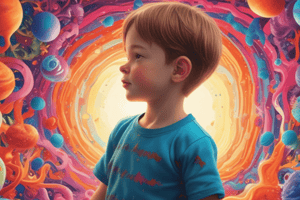Podcast
Questions and Answers
What is the main focus of Erikson's Psychosocial Development Theory?
What is the main focus of Erikson's Psychosocial Development Theory?
- The cognitive abilities that children develop during childhood
- The emotional intelligence that children develop during adolescence
- The physical changes that occur from birth to adolescence
- The conflicts or crises experienced through social interaction (correct)
Why is it important to observe and monitor a child's development?
Why is it important to observe and monitor a child's development?
- To compare their development with their siblings
- To ensure that the child is meeting their parental expectations
- To detect any difficulties at a particular stage and provide intervention (correct)
- To educate the child about their developmental milestones
Who typically uses a checklist to monitor a child's development?
Who typically uses a checklist to monitor a child's development?
- Psychologists and researchers
- Social workers and counselors
- Educators and policymakers
- Parents, teachers, and pediatricians (correct)
When did interest in child development begin to focus on detecting abnormalities?
When did interest in child development begin to focus on detecting abnormalities?
How many stages are described in Erikson's Psychosocial Development Theory?
How many stages are described in Erikson's Psychosocial Development Theory?
What is the primary goal for a child during the Autonomy vs. Shame/Doubt stage?
What is the primary goal for a child during the Autonomy vs. Shame/Doubt stage?
What is the outcome if a child's needs are met during the Trust vs. Mistrust stage?
What is the outcome if a child's needs are met during the Trust vs. Mistrust stage?
What is the typical age range for the Industry vs. Inferiority stage?
What is the typical age range for the Industry vs. Inferiority stage?
What is the term used when development does not follow the normal course?
What is the term used when development does not follow the normal course?
What is the primary goal for a child during the Initiative vs. Guilt stage?
What is the primary goal for a child during the Initiative vs. Guilt stage?
Flashcards are hidden until you start studying




